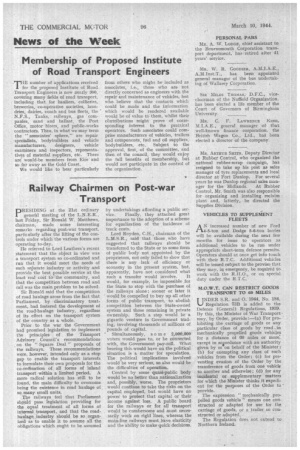Railway Chairmen on Post-war Transport
Page 18

If you've noticed an error in this article please click here to report it so we can fix it.
PRESIDING at the 21st ordinary general meeting of the L.N.E.R., last Friday, Sir Ronald W. Matthews, chairman, made some interesting remarks regarding post-war transport, particularly after the lifting of the controls under which the various forms are operating to-day.
He referred to Lord Leathers's recent statement that the object in view was a transport system so co-ordinated and run that it would meet the needs of each separate industry or activity and provide the best possible service at the least real cost to the community, and that the competition between road and rail was the main problem to be solved.
Sir Ronald said that the competition of road haulage arose from the fact that Parliament, by discriminatory treatment, had fostered the development of the road-haulage industry, regardless of its effect on the transport system of the country as a whole.
Prior to the war the Government had promised legislation to implement the principles of the Transport Advisory Council's recommendations , on the "Square Deal" proposals of the railways. These recommendations were, however, intended only as a stop gap to enable the transport interests to formulate their own proposals for the co-ordination of all forms of inland transport within a limited period. A more radical solution has still to be found, the main difficulty to overcome being the existence in road haulage of so, many. small units.
The railways feel that Parliament should pass legislation providing for the equal treatment of all forms of internal transport, and that the roadhaulage, industry should be so organized as to enable it to assume all the obligations which ought to be assumed by undertakings affording a public ser vice. Finally, they attached great importance to the adoption of a scheme for equalization of the . incidence of track costs.
Lord Royden, C.H., chairman of the L.M.S.R., said that those, who have suggested that railways should be transferred to the State or to some form of public body not appointed by the proprietors, not only failed to show that there is any lack of efficiency or economy in the present system, but, apparently, have not considered what such a transfer would involve. It would, for example, be impossible for the State to stop with the purchase of the railways alone ; sooner or later it would be compelled to buy up all other forms of public transport, • to abolish competition between the State-owned system and those remaining in private ownership. Such a step would be a gigantic venture in Government trading, involving thousands of millions of pounds of capital.
Simultaneously, some 2,000,000 voters would pass to, or be connected with, the Government pay-roll, What bearing this would have on the political situation is a matter for speculation. The political implications involved would be very serious, so also would be the difficulties of operation.
Control by some quasi-public body would be no better than nationalization and, possibly, worse. The proprietors would continue to take the risks on the capital employed, but would have no power to protect that capital or their income against loss. A public board for the railways or for all transport , would be cumbersome and must necessarily work on rigid lines, whereas the main-line railways must have elasticity and the ability to make quick decisions.




















































